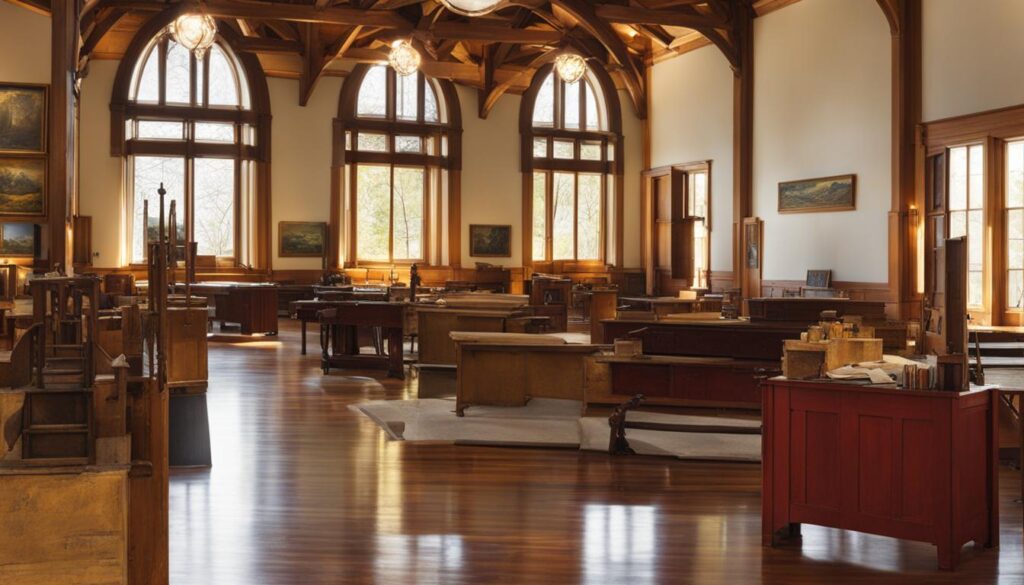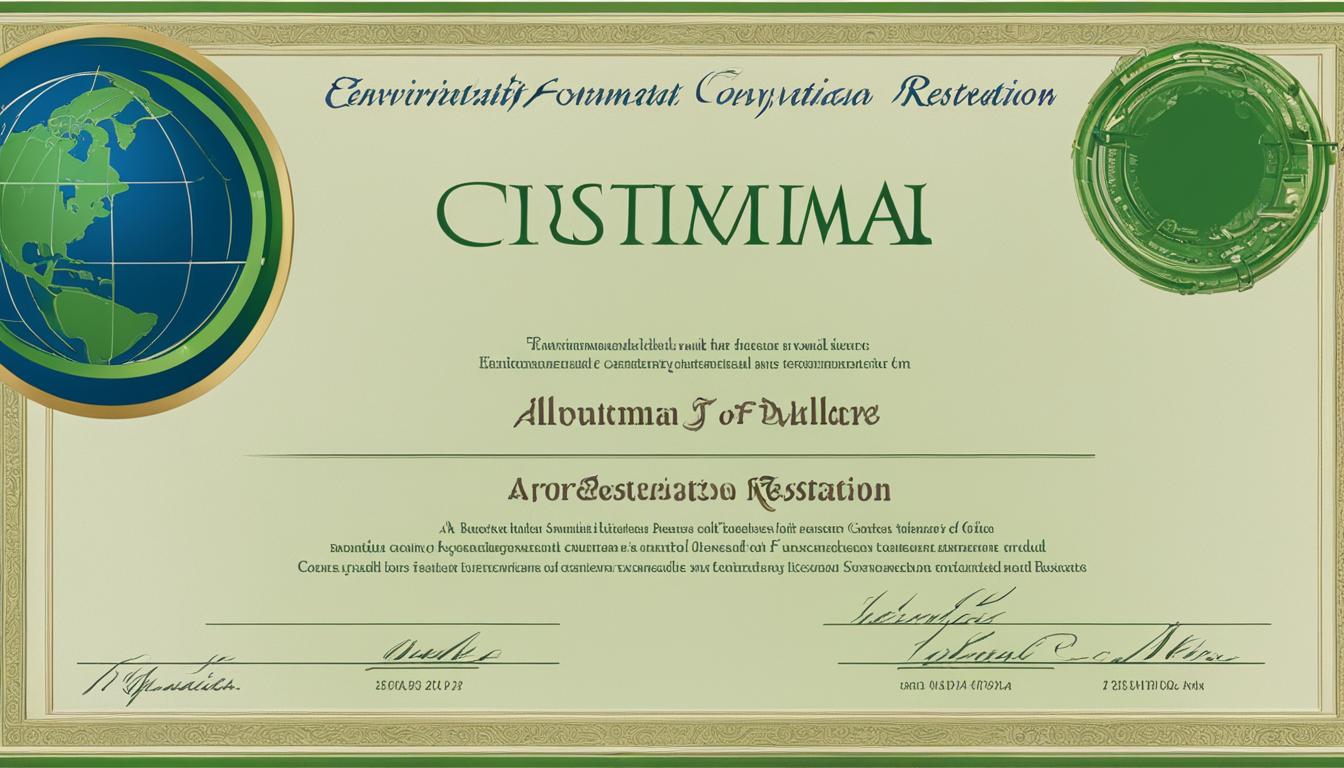If you have a passion for preserving art and history, pursuing a Bachelor of Arts in Conservation Restoration is the first step towards a rewarding career in this field. Conservation restoration involves a range of activities aimed at preserving and conserving cultural heritage, making it a vital profession. While many job postings in this field require an advanced degree, starting with a bachelor’s degree can provide a solid foundation for further studies and career advancement.
Key Takeaways:
- Conservation restoration is a field dedicated to preserving art and history.
- A Bachelor of Arts in Conservation Restoration is an excellent foundation for further studies and career advancement.
- Most job postings in conservation restoration require at least a master’s degree.
- Pursuing a bachelor’s degree in restoration can provide access to practical experience with original artworks and historical objects.
- Marist College offers a unique conservation studies and art restoration program for undergraduate students.
The Journey to Becoming a Conservator
The journey to becoming a conservator involves several stages. Before entering a graduate program in conservation, aspiring conservators often go through a pre-program phase where they gain exposure and experience in the field of conservation. This can be done through internships, volunteering, or paid technician positions in conservation facilities. It is during this phase that students can acquire the necessary courses, skills, and experience required for admission to graduate programs in conservation.
After completing a Bachelor of Arts in Conservation Restoration, graduates can pursue further studies at the master’s level or gain practical experience through post-graduate fellowships and project-based positions. Job prospects in conservation restoration are promising, with a majority of professional conservators holding advanced degrees and many job postings requiring at least a master’s degree.
“The journey to becoming a conservator is unique to each individual, but it often starts with a passion for art and a desire to preserve culture for future generations. Through hands-on experience, academic study, and dedication, one can embark on a fulfilling career in conservation restoration.”
Pre-Program Phase: Gaining Exposure and Experience
Before entering a graduate program, it is crucial to gain hands-on experience and develop a solid foundation in conservation restoration. This can be achieved through various avenues such as:
- Internships: Interning at museums, galleries, or conservation laboratories allows aspiring conservators to observe and learn from professionals in the field. It provides an opportunity to work on real restoration projects and gain practical skills.
- Volunteering: Volunteering at cultural institutions or nonprofit organizations allows individuals to contribute to the preservation of cultural heritage while gaining valuable experience and networking opportunities.
- Paid Technician Positions: Some conservation facilities offer paid technician positions where individuals can work alongside experienced conservators and learn essential techniques.
The Path After a Bachelor’s Degree in Restoration
After completing a Bachelor of Arts in Conservation Restoration, graduates have several options to further their journey:
- Pursue a Master’s Degree: Many aspiring conservators choose to pursue advanced degrees in conservation restoration, which provide in-depth knowledge and specialization in specific areas of conservation.
- Obtain Practical Experience: Graduates can gain practical experience by participating in post-graduate fellowships or project-based positions. These opportunities allow them to refine their skills and build a strong portfolio.
- Attend Professional Workshops and Conferences: Continuing education through workshops and conferences keeps conservators updated on the latest techniques and research in the field.
With an increasing demand for conservation restoration experts, job prospects in the field are promising. Many institutions require conservators to have at least a master’s degree, presenting a great opportunity for those with advanced education to secure fulfilling careers in conservation restoration.
The Benefits of a Bachelor of Arts in Conservation Restoration
Pursuing a Bachelor of Arts in Conservation Restoration offers numerous benefits. This program provides a comprehensive understanding of conservation principles and techniques, preparing students for a range of careers in the field. Students in a Bachelor of Arts in Conservation Restoration program have access to hands-on training and the opportunity to work on original artworks and historical objects. This practical experience is invaluable in developing the necessary skills and expertise to become a professional conservator. Additionally, a bachelor’s degree in restoration can serve as a solid foundation for further studies at the graduate level, opening up additional career opportunities and advancement in the field of conservation restoration.
“A bachelor’s degree in Conservation Restoration is an excellent starting point for a career in the field. It provides students with technical and theoretical knowledge, as well as practical skills that are essential for success in this industry. The hands-on training and real-world experience gained through working on original artworks prepare graduates to tackle the challenges they will face as conservators.”
By pursuing a Bachelor of Arts in Conservation Restoration, you can:
- Develop a comprehensive understanding of conservation principles and techniques.
- Gain hands-on experience working on original artworks and historical objects.
- Acquire the necessary skills and expertise to become a professional conservator.
- Build a solid foundation for further studies at the graduate level.
- Open up additional career opportunities and advancement in the field of conservation restoration.
With a growing demand for skilled conservation restorers, a Bachelor of Arts in Conservation Restoration can pave the way for a rewarding career in preserving our cultural heritage.
The Marist College Conservation Studies and Art Restoration Program
The Marist College Conservation Studies and Art Restoration Bachelor’s degree program offers undergraduate students a unique opportunity to learn the art of caring for and restoring valuable pieces of art and history. This program focuses on the preservation and conservation of artworks ranging from the 14th to 19th centuries. Students have the privilege of working directly on original materials and objects, under the guidance of experienced faculty members. The program also offers opportunities for travel and work in different countries and cultures, providing a global perspective on art restoration and conservation.

Program Highlights:
- Hands-on experience restoring artworks from the 14th to 19th centuries
- Guidance from experienced faculty members
- Opportunities for travel and work in different countries and cultures
Course Curriculum:
| Course Code | Course Name |
|---|---|
| ART 101 | Introduction to Art Restoration |
| ART 201 | Conservation Principles and Techniques |
| ART 301 | Preservation of Historical Artifacts |
| ART 401 | Advanced Restoration Techniques |
| ART 501 | Research and Analysis in Conservation Restoration |
“The Marist College Conservation Studies and Art Restoration Program has provided me with invaluable hands-on experience and a comprehensive understanding of art restoration techniques. The guidance from experienced faculty members has been instrumental in shaping my skills as a conservator.” – Emily Thompson, Art Restoration and Conservation Studies Bachelor’s Degree Graduate
Conclusion
Considering a career in conservation restoration? Earning a Bachelor of Arts in Conservation Restoration is the perfect starting point. This degree not only equips you with a solid foundation in conservation principles and techniques but also opens up a world of opportunities for further studies and career advancement in this field.
With a Bachelor of Arts in Conservation Restoration, you can choose to continue your education at the graduate level or gain practical experience through internships and fellowships. The demand for professional conservators is high, and job prospects in this field are promising, making it an attractive career path for those passionate about preserving cultural heritage.
By enrolling in a Bachelor of Arts in Conservation Restoration program, you’ll acquire the skills and expertise necessary to play a vital role in preserving art and history for future generations. Whether you choose to specialize in the restoration of paintings, sculptures, or historical artifacts, your contribution to preserving our cultural heritage will be significant.
Don’t miss out on the opportunity to embark on an exciting and meaningful career in conservation restoration. Consider pursuing a Bachelor of Arts in Conservation Restoration today and take the first step towards a fulfilling profession that combines your passion for art and history with the preservation of our global cultural heritage.
FAQ
Can I pursue a career in conservation restoration with a Bachelor of Arts in Conservation Restoration?
Yes, a Bachelor of Arts in Conservation Restoration can lead to a rewarding career in preserving art and history. While most job postings in the field of conservation restoration require at least a master’s degree, starting with a bachelor’s degree can provide a strong foundation for further studies and career advancement.
What is the journey to becoming a conservator?
The journey to becoming a conservator typically involves gaining exposure and experience in the field of conservation through internships, volunteering, or paid technician positions. After completing a Bachelor of Arts in Conservation Restoration, graduates can pursue further studies at the master’s level or gain practical experience through post-graduate fellowships and project-based positions.
What are the benefits of earning a Bachelor of Arts in Conservation Restoration?
Pursuing a Bachelor of Arts in Conservation Restoration provides a comprehensive understanding of conservation principles and techniques, practical experience working on original artworks and historical objects, and a solid foundation for further studies at the graduate level. It opens up a range of career opportunities in the field of conservation restoration.
What is the Marist College Conservation Studies and Art Restoration program?
The Marist College Conservation Studies and Art Restoration program offers undergraduate students the opportunity to learn the art of caring for and restoring valuable pieces of art and history. The program focuses on the preservation and conservation of artworks ranging from the 14th to 19th centuries, providing hands-on training and the chance to work directly on original materials and objects.

